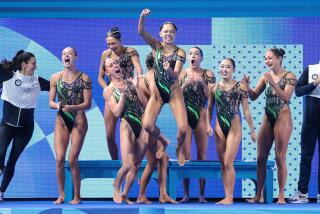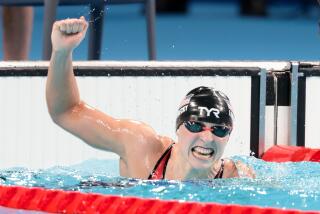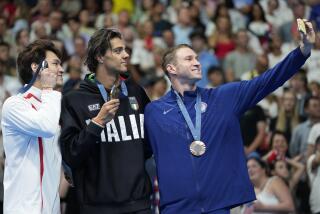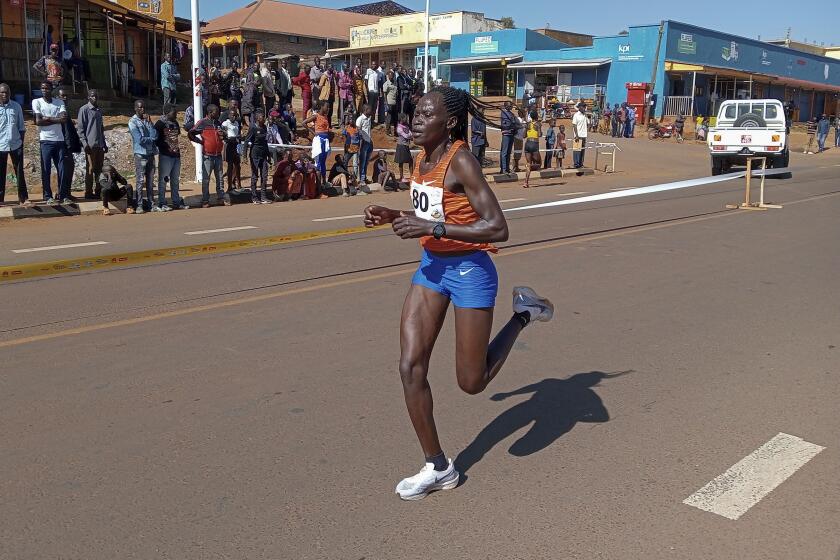SWIMMING PAN PACIFIC GAMES : Rouse Leads U.S. Gold Medal Rush
EDMONTON, Canada — American Jeff Rouse knows the new “no-touch” turn is faster, but after coming up shy of David Berkoff’s 100-meter backstroke world record of 54.51 seconds at the Pan Pacific Championships Thursday night, Rouse says its benefits are overrated.
“Maybe we think with the new turn that we can get out (swim the first 50 meters) faster than we can,” Rouse said after clocking a 26.71 at the halfway point and finishing in 54.67 seconds, the third-fastest time in history.
“The start, the turn, the underwater stuff was all really good, but I expected to be out a half-second faster at least.”
A near-capacity crowd of 1,200 turned out at the Kinsmen Aquatic Centre to see the race between Rouse and Mark Tewksbury, Canada’s best hope for a gold medal.
Tewksbury couldn’t match Rouse’s speed, but his 55.19 earned him a silver medal, a Canadian record and a berth on his country’s 1992 Olympic team.
Rouse was one of five Americans who struck gold on the first day of competition in the pool. The United States also collected three silver medals and a bronze.
In winning the women’s 100 backstroke, 16-year-old Janie Wagstaff lowered her American record with a 1:01.00, just under the 1:01.10 she set in April and the fifth-fastest time ever.
“It is exciting,” Wagstaff said, “but I’d like to break 1:01.00. Fortunately, I still have a chance in the (400 medley) relay.”
In a demonstration of superior depth, U.S. swimmers recorded nine of the top 12 times in the women’s 200 freestyle preliminaries. Only two Americans advanced to the championship final, under the international rules that limit each nation to two swimmers in the eight-person final field.
The U.S. coaching staff let the Americans battle among themselves for the berths instead of designating the top two qualifiers from the selection meet.
“Last time we didn’t use this format and a young swimmer named Summer Sanders swam the fastest time in the 200 butterfly and didn’t make the final,” U.S. women’s Coach Mark Schubert said. “It protects us against someone who didn’t train well this summer. It is somewhat controversial, but when you select a team in April for a meet in August it is the only way to go.”
Two favorites on the men’s team fell victim to the policy change.
Berkoff, who came out of retirement earlier this year, was aced out of the finals by four-hundredths of a second by eventual bronze medalist Jeff Thibault. Troy Dalbey, the sixth-fastest 200 freestyler in the world this year, also missed the finals when he finished behind Americans Joey Hudepohl, Jon Olson and Dan Jorgensen in his specialty.
Hudepohl swam the fastest preliminary time, a 1:49.45, but in the finals he could not match it. Australian Ian Brown prevailed with a 1:49.48. Hudepohl, 17, of Cincinnati, touched in 1:49.63.
In the women’s 200-meter freestyle, Sarah Anderson of Moreno Valley clocked a Pan Pacific record of 2:00.41 in the consolation finals, but Nicole Haislett of St. Petersburg, Fla., broke it in the championship finals with a 2:00.31, the fastest time in the world this year.
Swimming Notes
Summer Sanders, world champion in the 200 butterfly, won the gold in 2:09.84, just off the time she swam in January, which is the fastest in the world this year. . . . Melvin Stewart, 200 butterfly world record-holder, won his specialty in a disappointing 1:57.92, almost two seconds off his world mark. Dave Wharton, who finished his eligibility at USC last spring, took the silver in 1:59.98.
More to Read
Go beyond the scoreboard
Get the latest on L.A.'s teams in the daily Sports Report newsletter.
You may occasionally receive promotional content from the Los Angeles Times.







